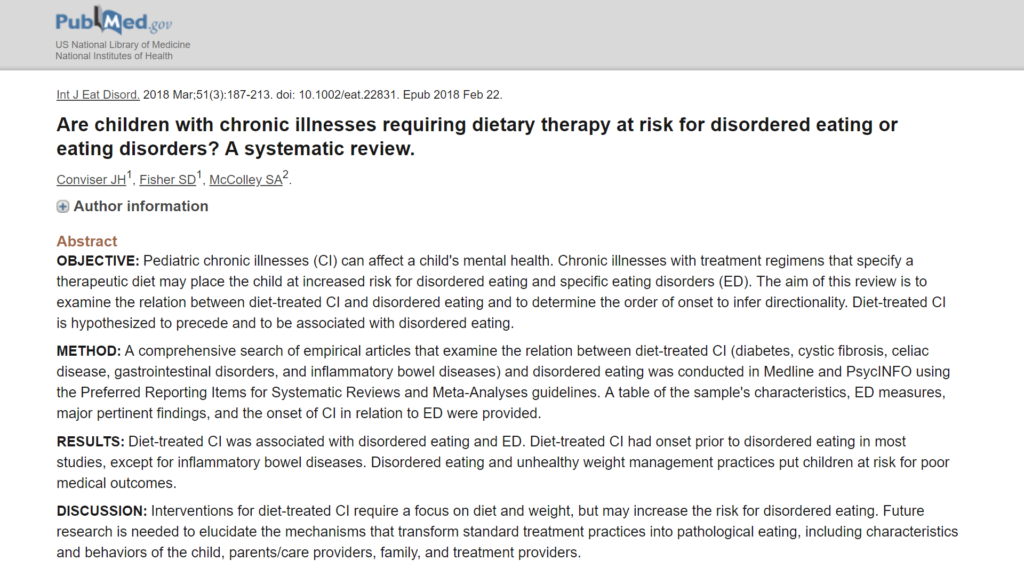Dieting Can Lead to Eating Disorders in Children – Quality Study Finds
A systematic review of high quality data, has recently found that dieting increases the risk of eating disorders in children. How do we help ill children improve their health through diet without causing psychological damage? Let’s discuss.
- Researchers performed a comprehensive search of empirical articles that examine the relationship between diet-treated chronic illness (diabetes, cystic fibrosis, celiac disease, gastrointestinal disorders, and inflammatory bowel diseases) and disordered eating.
RESULTS
- Diet-treated chronic illness (CI) was associated with disordered eating and eating disorders.
- Diet-treated CI had onset prior to disordered eating in most studies, except for inflammatory bowel diseases. Disordered eating and unhealthy weight management practices put children at risk for poor medical outcomes.
DISCUSSION
- Interventions for diet-treated CI require a focus on diet and weight, but may increase the risk for disordered eating. Future research is needed to elucidate the mechanisms that transform standard treatment practices into pathological eating, including characteristics and behaviors of the child, parents/care providers, family, and treatment providers.
Download this Episode (right click link and ‘Save As’)
Dr. Michael Ruscio: Hi, this is Dr. Ruscio with what I think is a very important update regarding diets and children. And I’d like to cover with you the results of a systematic review, and I’ll read the title and put the abstract up here on the screen. “Are Children with Chronic Illness Requiring Dietary Therapy at Risk for Disordered Eating or Eating Disorders: A Systematic Review.”

And remember, a systematic review will attempt to look at all of the available evidence and give us a summary of what the data shows. And essentially, what this study concluded was… Well, I’ll read it to you here.
“Diet-treated chronic illness was associated with disordered eating and eating disorder.” That’s just part of their conclusion. So essentially what they found was when children have chronic illness that requires dietary therapy or dietary management, they are at a higher risk for eating disorders.
Now, there’s a tough balance to be struck here. On the one hand, of course, we want to help a child feel better, absolutely. On the other hand, we want to be careful not to coerce them, if you will, or inadvertently lead them into an eating disorder. So I don’t proclaim to have the answer to this, but I will tell you what I do. And I do have a strong sneaking suspicion that this is helpful and probably the most healthful way to approach this.
We make dietary recommendations with children in our practice, but we absolutely avoid anything that would even approach using the technique of fear. And we do not give them strict guidelines, and we try to make the diet something that we recommend that they do. But to put it simply, we don’t try to make it a big deal.
Because children have fragile psyches. And we want to do everything we can not to expose them to fear around food because there is the chance that they will bring that forward with them for the rest of their lives. So we can use diet. We can make dietary recommendations. But using fear and recommending diets that are overly strict in my opinion, A) lead to poor compliance because kids will say, “Screw it. I don’t want to do it.” Or, B) it may lead them the other way: to be overly neurotic about food and lead to an eating disorder.
So similar to what I recommend with adults, not to be hard-lined and give these very rigid mandates. We want to use that same approach with children, at least as best as I can recommend. I don’t know that we have any data that definitively answers this question. But we want to be careful not to tell a child, for example, “Oh, you have Hashimoto’s. You can never have gluten again or it’s going to flare your antibodies.”

That discussion is damaging to adults. I would say it’s even more damaging to children. So we can leave the fear-mongering out of the conversation, and we can use language perhaps more so of, “Generally avoiding grains may help you feel better and may be better for your thyroid. But if every once in a while, there’s a birthday party or what have you and you want to partake, that’s OK. Just be mindful of how you feel. And if you notice you feel really poorly when you’re eating certain foods, then you may want to avoid those more so in the future.”
I think that is a very reasonable dialogue to have with a child, not to make them afraid that they’re going to be fueling an autoimmune condition or fueling an inflammatory process, which is probably well-intentioned underneath the surface. But if we don’t identify and recognize the fact that that actually may be psychologically damaging to the child, then we’re probably doing more damage than we are good.
So something I think for all parents, healthcare practitioners to keep in mind is that, yes, we want to help children become more healthy by using diet. But we want to strike a very careful and cautious balance, not to be overzealous and to tip them into an eating disorder, which unfortunately is starting to be documented. So just food for thought, and I more than welcome comments that people may have who are working with children and who have found techniques to be helpful. And feel free to post those below here.
Ok. This is Dr. Ruscio, and hopefully this helps you get healthy and get back to your life. Thanks.
Dr. Michael Ruscio is a DC, natural health provider, researcher, and clinician. He serves as an Adjunct Professor at the University of Bridgeport and has published numerous papers in scientific journals as well as the book Healthy Gut, Healthy You. He also founded the Ruscio Institute of Functional Health, where he helps patients with a wide range of GI conditions and serves as the Head of Research.


Discussion
I care about answering your questions and sharing my knowledge with you. Leave a comment or connect with me on social media asking any health question you may have and I just might incorporate it into our next listener questions podcast episode just for you!